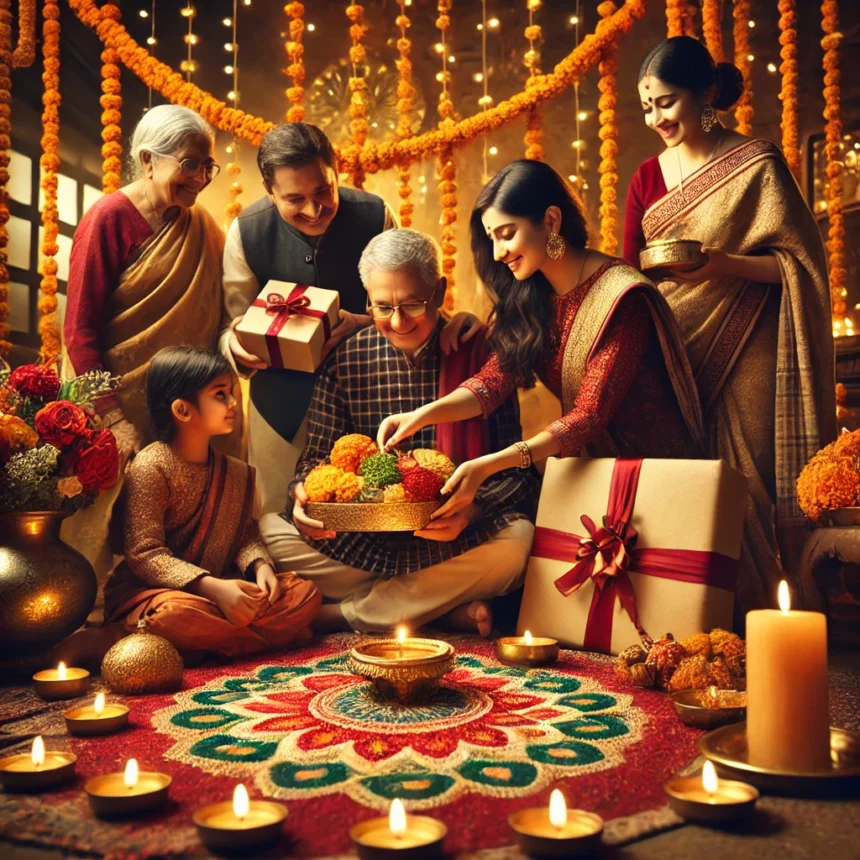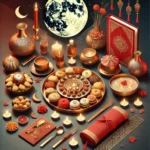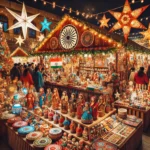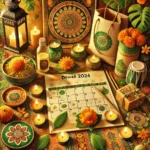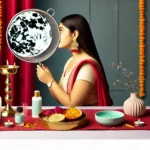Diwali – More Than Just a Festival
Diwali, the festival of lights, holds a special place in the hearts of millions of people around the globe. Celebrated by Hindus, Sikhs, Jains, and Buddhists, it marks the triumph of light over darkness, good over evil, and knowledge over ignorance. But beyond the lamps, the fireworks, and the rituals, Diwali is a festival that epitomizes togetherness. It is a time when families reunite, friends come together, and communities celebrate as one.
The essence of Diwali lies not only in the religious and mythological significance but also in the spirit of camaraderie, love, and bonding that it fosters. It is more than just a religious festival – Diwali has evolved into a cultural celebration where personal connections and relationships are cherished. The act of meeting family, relatives, and friends during Diwali carries immense importance as it serves as a time for reconciliation, shared joy, and collective prosperity.
This is why gifting has become an integral part of Diwali celebrations. Exchanging gifts isn’t just a custom; it’s a way of showing appreciation, love, and gratitude to those who matter most. Gifting, during Diwali, is a symbol of abundance and well-wishing. It represents the sharing of prosperity and the spreading of happiness. In a fast-paced world where connections can sometimes feel distant, Diwali gifting serves as a reminder of the importance of human relationships and the joy of giving.
The Significance of Diwali
Diwali isn’t confined to India; it’s a festival celebrated by Indians and Indian-origin communities around the world. Whether it’s in the bustling streets of New Delhi, the temples of Singapore, or the homes of Indian diaspora in the United States and Europe, Diwali is a festival that transcends borders and unites people in celebration.
Diwali’s Global Appeal
The beauty of Diwali lies in its universal themes – the victory of light over darkness and good over evil. No matter where one is, the lighting of diyas (earthen lamps) during Diwali symbolizes hope, new beginnings, and the eradication of negativity. The festival serves as a reminder that even in challenging times, there is always a ray of light to guide the way forward.
For the global Indian community, Diwali is a way to stay connected to their roots. It allows them to uphold traditions and pass on their cultural heritage to future generations, no matter where they reside. Indians living abroad often host grand Diwali gatherings, complete with traditional food, fireworks, and puja ceremonies, reinforcing their bond with the homeland. The significance of these celebrations lies in the fact that they offer a sense of belonging and shared identity, even when living far from home.
Unique Celebrations Across India
Diwali is celebrated across India, but its rituals and practices differ in various regions, offering a rich tapestry of cultural diversity. The spirit of Diwali, however, remains universal – the victory of light over darkness and the sharing of joy and prosperity. This section delves into how different regions in India mark the occasion, each with its own customs and stories.
North India
In Northern India, Diwali is most famously associated with the return of Lord Ram to Ayodhya after his 14-year exile and triumph over the demon king Ravana. According to the Ramayana, the people of Ayodhya celebrated his return by lighting diyas (oil lamps) throughout the kingdom, symbolizing the victory of good over evil. This tradition continues today, as households light up every corner of their homes with oil lamps, fairy lights, and candles. Diwali in the North is also the time for spectacular fireworks displays, symbolizing the joy and enthusiasm that accompanied Ram’s homecoming.
The festival lasts for five days, with each day dedicated to specific rituals:
• Dhanteras: The first day marks the beginning of the festival. On this day, people traditionally buy gold, silver, or kitchen utensils as a sign of prosperity.
• Chhoti Diwali: The second day, also known as Naraka Chaturdashi, commemorates Lord Krishna’s victory over the demon Narakasura.
• Main Diwali: The third day is the most significant and is dedicated to the worship of Goddess Lakshmi, the deity of wealth and prosperity. Lakshmi Puja is performed in homes and businesses alike, seeking her blessings for a prosperous year ahead.
• Govardhan Puja: The fourth day celebrates Lord Krishna lifting the Govardhan hill to protect his devotees.
• Bhai Dooj: The fifth and final day of Diwali is dedicated to the bond between brothers and sisters, akin to Raksha Bandhan. Sisters pray for their brothers’ long life, while brothers give gifts in return.
West India
In Gujarat and Maharashtra, Diwali is equally vibrant but carries its unique cultural significance. For the Gujarati community, Diwali marks the end of the financial year, making it an important time for traders and businessmen. The day after Diwali, Bhai Bij in Gujarat, marks the beginning of the new business year with traditional prayers for success and prosperity in the year ahead. It’s common for business owners to perform a Chopda Pujan, where they open new accounting books, symbolically starting fresh and invoking the blessings of Goddess Lakshmi for financial growth.
In Maharashtra, Diwali festivities are similar but include a special emphasis on the ritual of Vasu Baras, dedicated to the worship of cows, which hold great spiritual and agricultural importance. On the day of Padwa, married couples exchange gifts, symbolizing their mutual love and respect.
East India
In Bengal, Diwali is celebrated as Kali Puja, honoring the fierce goddess Kali. Devi Kali represents power, destruction of evil, and the ultimate victory of the divine feminine. The rituals associated with Kali Puja include the sacrifice of pumpkins or cucumbers to symbolize victory over ignorance. The night is spent in devotion, with homes and temples illuminated with lamps and candles, while people offer flowers, sweets, and fruits to the goddess.
Unlike in other parts of India, where Diwali is focused on Lakshmi, the eastern region’s devotion to Kali brings a different spiritual dimension to the festival. The streets of Kolkata come alive with massive clay idols of the goddess Kali, beautifully adorned and worshipped in grand pandals.
South India
In South India, Diwali is celebrated with early morning festivities. Known as Deepavali, it commemorates the defeat of the demon Narakasura by Lord Krishna. People start their day before sunrise by taking an oil bath, believed to purify the body and soul. This is followed by the wearing of new clothes and bursting firecrackers.
Deepavali also sees people preparing and sharing festive delicacies, including sweets like mysore pak, laddu, and payasam. The celebration in South India is typically quieter compared to the noisy revelries of the North, but it is equally significant in its expression of family and communal harmony.
In Karnataka, Tamil Nadu, and Andhra Pradesh, the focus remains on both family gatherings and spiritual practices, with homes decorated using Rangoli patterns and rows of oil lamps to welcome divine energy and blessings into the house.
Pooja Vidhi for Diwali
One of the most sacred aspects of Diwali is the Lakshmi Puja, performed on the main day of the festival. The worship of Goddess Lakshmi, the goddess of wealth and prosperity, is a key tradition for Hindus. The puja is believed to invite the goddess into homes and businesses, blessing the devotees with financial growth, happiness, and peace. Here’s a detailed guide to performing the Lakshmi Puja, which involves both devotion and meticulous preparation.
Preparation for the Puja
Before the actual rituals, the home is thoroughly cleaned and decorated, symbolizing the removal of obstacles and inviting auspiciousness. Many families create elaborate Rangoli designs at the entrance to welcome guests, both divine and human. The entire household is brightened with diyas and fairy lights, ensuring that every corner is illuminated, as darkness is considered inauspicious on this day.
The puja altar is set up with an idol or picture of Goddess Lakshmi, often accompanied by Lord Ganesha, the remover of obstacles. The following items are gathered for the puja:
• Silver or brass coins
• Flowers (preferably marigold or lotus)
• Incense sticks
• Diyas (oil lamps)
• Sweets (such as laddus or modaks)
• Fruits (bananas, coconuts, etc.)
• Betel leaves and nuts
• Holy water from the Ganges (if available)
• A kalash (a small vessel with water, mango leaves, and a coconut placed on top)
Step-by-Step Pooja Vidhi
1. Invocation of the Deities: Start by invoking Lord Ganesha, chanting mantras that remove obstacles and ensure the puja proceeds smoothly. Offer flowers, sweets, and incense to Lord Ganesha.
2. Kalash Puja: The kalash represents the divine presence and is placed in front of the idols. The water within symbolizes the universe, while the coconut represents the head of creation. Prayers are offered to the kalash, asking for the divine energy to reside in it during the puja.
3. Lakshmi Invocation: The main focus of the puja is the invocation of Goddess Lakshmi. The family members offer flowers, rice, and coins while reciting Lakshmi mantras. During this time, it’s important to keep the mind focused on the goddess and the prosperity she brings.
4. Offering of Prasad and Diyas: After the mantras, sweets, fruits, and betel nuts are placed in front of the deity as offerings (prasad). The diyas are lit and placed around the home and the puja area. The lighting of diyas signifies the removal of darkness and ignorance.
5. Aarti: The puja concludes with an aarti, where the family sings traditional hymns in praise of Goddess Lakshmi. The lamp is rotated in front of the deity in a clockwise motion, symbolizing the offering of light. During the aarti, bells are rung, and everyone in the household participates by taking turns to perform the aarti.
6. Distribution of Prasad: After the aarti, the prasad is distributed to all family members, symbolizing the sharing of the goddess’s blessings.
7. Placing of Coins: After the puja, coins and cash are placed in the family’s safe or treasure box to invoke wealth and financial stability in the coming year.
The Lakshmi Puja is not only about material wealth but also about spiritual prosperity. It is believed that Goddess Lakshmi visits homes that are clean, peaceful, and illuminated with positivity, blessing the inhabitants with both physical and spiritual abundance.
The Importance of Gifting on Diwali
Diwali is not just a festival of lights; it is also a time to express love, appreciation, and gratitude through the tradition of gifting. Gifting during Diwali goes beyond the exchange of material items; it represents a deeper cultural and emotional significance, rooted in centuries of tradition.
The Origin of Gifting During Diwali
The tradition of gifting during Diwali has ancient roots and is intertwined with the broader theme of the festival – prosperity, happiness, and the triumph of good over evil. In Hindu mythology, Diwali celebrates the return of Lord Ram to Ayodhya after his victory over the demon Ravana. The people of Ayodhya, in their joy, lit up the entire city and exchanged sweets and gifts to mark the auspicious occasion. This act of sharing symbolized the communal happiness and collective prosperity of the people.
Over time, the custom of exchanging gifts during Diwali evolved to become a way of spreading goodwill, reinforcing relationships, and ensuring that the spirit of joy reaches everyone in the community. Gifting became a way to share one’s success and fortune with others, ensuring that prosperity and happiness were not confined to oneself but extended to family, friends, and even business partners.
Symbol of Love and Respect
Gifting during Diwali is not just a formality; it is a way of expressing deep emotions. A well-chosen gift reflects thoughtfulness, care, and respect for the recipient. It’s a way to convey one’s best wishes for prosperity, health, and happiness in the year ahead. Whether it’s a simple box of sweets or an elaborate gift hamper, the meaning behind the gesture remains the same – it is an expression of gratitude, respect, and a wish for mutual growth and success.
In families, especially, gifts serve as an emotional bridge between generations. Elders present gifts to younger members of the family as a sign of blessings, while children give symbolic gifts to their elders as a mark of respect and reverence. Among friends, gifts strengthen bonds, reaffirming the ties of friendship and camaraderie. In the professional world, gifting between colleagues, clients, and partners helps build stronger business relationships, reflecting trust, mutual respect, and a sense of goodwill.
Strengthening Bonds Through Gifting
Diwali gifting plays a crucial role in maintaining and nurturing relationships, both personal and professional. In the fast-paced modern world, where people often live far from family and friends, Diwali presents an opportunity to reconnect and rekindle relationships. The act of giving is as fulfilling as receiving, fostering a sense of community and unity.
• Among Family Members: Diwali gifts within families help to deepen relationships. Elders often give gifts of jewelry, clothes, or even cash to the younger generation, symbolizing their blessings for a prosperous future. Children, in return, offer gifts such as sweets or handmade items to express their love and respect. It’s not uncommon for entire families to come together for Diwali, sometimes traveling long distances just to be with their loved ones.
• Among Friends: Exchanging gifts between friends during Diwali is a way of expressing appreciation for the friendship. These gifts often have personal significance and are chosen based on shared memories or mutual interests, making the bond stronger.
• In Professional Circles: In the business world, gifting clients, employees, and business partners is a common practice during Diwali. These gifts are not just tokens of appreciation but are also seen as a way to enhance professional relationships. It symbolizes trust, goodwill, and the desire to continue growing together in mutual success.
Traditional Gifts for Diwali
While the nature of gifts has evolved over time, traditional Diwali gifts continue to hold significant cultural value. Some of the most popular gifts during Diwali include:
• Sweets and Dry Fruits: Sharing sweets is an age-old tradition during Diwali. Mithai boxes or dry fruit hampers are the most common gifts, symbolizing the sweetness and abundance of life. They are often exchanged between family members, friends, and neighbors.
• Clothes and Jewelry: Diwali is considered an auspicious time to buy new clothes and jewelry. Many people gift new clothes or accessories to their loved ones, representing the wish for a prosperous and joyful future.
• Silver Coins and Idols: Silver coins, often engraved with images of Goddess Lakshmi or Lord Ganesha, are gifted as a symbol of wealth and prosperity. Similarly, small idols of deities are gifted for their spiritual significance.
• Gifts for the Home: Home decor items such as lamps, candle holders, and even kitchenware are popular Diwali gifts. These gifts symbolize the act of lighting up and beautifying one’s home, both literally and figuratively.
Modern Gifting Trends
In recent years, Diwali gifting has also taken on a more modern twist. Eco-friendly gifts, personalized items, and tech gadgets have become popular choices. Some families and companies now choose to give personalized gifts, such as custom-made jewelry, engraved items, or monogrammed accessories, adding a personal touch to the gesture.
The trend of eco-friendly gifting is also on the rise, with more people becoming environmentally conscious. Gifts made from sustainable materials, organic products, or even planting trees in the recipient’s name have become a way to show that one cares about both the planet and the person.
Other Cultural and Social Significance of Diwali
Diwali is far more than a religious celebration; it is deeply embedded in the cultural and social fabric of Indian society. Beyond the myths and legends, Diwali holds layers of significance that reflect both individual and collective aspirations. From economic rejuvenation to social unity, Diwali plays a multifaceted role in Indian culture.
Cleansing and Renewal
One of the key rituals of Diwali is the thorough cleaning of homes and workplaces, symbolizing the removal of past negativity and preparing for new beginnings. This practice isn’t just about physical cleanliness but also serves as a metaphor for the cleansing of the mind and spirit. The idea is to remove obstacles that hinder personal growth and create a space for positivity to flourish.
People often buy new clothes, repaint their homes, and renovate spaces during Diwali, representing renewal and the embracing of new opportunities. This concept of renewal is deeply tied to the festival’s themes of prosperity and progress.
The festival’s connection to harvest seasons further amplifies its symbolism of renewal. Diwali, falling at the end of the agricultural season, historically marked the time when farmers celebrated the fruits of their labor and prayed for prosperity in the coming year.
Economic Impact
Diwali is one of the biggest economic events in India. From the sale of gold, jewelry, and electronics to the booming markets for clothes, sweets, and fireworks, Diwali drives economic activity across multiple sectors. It is not just a religious festival but a period of economic rejuvenation.
Businesses of all sizes, from small traders to large corporations, experience a significant boost during Diwali. Retailers and online platforms offer festive discounts and special offers, resulting in a shopping frenzy. Many people wait for Diwali to make major purchases such as vehicles, electronics, or real estate, believing it to be an auspicious time.
The practice of gifting also plays a significant role in this economic surge. The exchange of gifts encourages spending, stimulating the economy as people purchase products ranging from luxury items to everyday essentials to share with loved ones.
Community Building and Charitable Acts
Diwali fosters a strong sense of community. Neighbors come together to decorate their streets, organize collective pujas, and celebrate with fireworks. The sense of unity that Diwali brings is palpable, as people across socioeconomic classes join in the celebrations. It is a time when barriers are broken, and people come together to celebrate their shared culture.
Charity is also an essential aspect of Diwali. Many families and businesses see the festival as an opportunity to give back to society. Acts of charity during Diwali range from feeding the underprivileged, donating clothes, and distributing sweets to contributing to charitable causes. These acts help reinforce the idea that prosperity is not only for oneself but should be shared with others, especially those who are less fortunate.
How Diwali Gifting Strengthens Relationships
Gifting is an essential part of Diwali celebrations, but it is more than just a customary exchange of material items. It is a profound gesture that fosters emotional connections, strengthens familial bonds, and deepens friendships. The practice of gifting during Diwali serves as a powerful tool for nurturing relationships across all aspects of life – from family to friends, and even professional networks.
Connecting Families Across Generations
Diwali is one of the most important times of the year for family gatherings, often bringing together generations of family members who may be separated by distance or busy schedules. Gifting plays a central role in these family reunions, as it is seen as an expression of love, respect, and goodwill.
For elders, giving gifts to younger family members is a way to pass on blessings, share their wisdom, and reinforce the bonds of tradition. These gifts often hold sentimental value, such as jewelry that has been in the family for generations, or symbolic items like coins and idols that represent prosperity and protection.
Children, in turn, offer gifts to their parents and elders, which can range from simple handmade items to more elaborate presents. These gifts are a token of gratitude and love, a way of showing appreciation for the support and care they have received throughout the year. This exchange of gifts helps to bridge the generational gap and creates a sense of continuity and togetherness within families.
In many homes, Diwali gifts also serve as a way to introduce young family members to the traditions and values associated with the festival. Children learn the importance of generosity, respect for elders, and the joy that comes from giving, all through the act of exchanging gifts.
Strengthening Friendships
The importance of friendship is also celebrated during Diwali, as friends come together to share the joys of the festival. Gifting among friends is not just about exchanging material items, but rather about celebrating the bond of friendship. These gifts can be symbolic of shared memories, inside jokes, or mutual interests, and are often personalized to make the recipient feel valued.
For many, Diwali is an opportunity to reconnect with old friends and rekindle relationships that may have become distant over time. The exchange of gifts serves as an icebreaker, creating opportunities to relive cherished moments and strengthen the bond that unites friends.
Building Professional and Business Relationships
In the professional world, Diwali gifting has become an important aspect of maintaining and strengthening business relationships. Companies often use Diwali as an opportunity to appreciate their employees, partners, and clients, acknowledging their contributions and reaffirming their commitment to long-term collaboration.
For employees, Diwali gifts from employers, such as bonuses, gift vouchers, or personalized tokens of appreciation, serve as a gesture of recognition and gratitude. These gifts help to boost morale and reinforce a sense of belonging within the organization.
For businesses, sending Diwali gifts to clients and partners is a way to nurture relationships, demonstrate goodwill, and enhance brand loyalty. These gifts, often curated to reflect the recipient’s preferences or business ties, symbolize trust, mutual respect, and a shared commitment to future success. In many cases, corporate Diwali gifts are also a means of reinforcing professional networks, helping businesses strengthen their connections in a competitive market.
Fostering a Sense of Belonging
At its core, Diwali gifting is about inclusion. Whether within families, among friends, or in professional settings, the act of giving and receiving gifts during Diwali fosters a sense of belonging. It strengthens emotional bonds, reaffirms connections, and helps to build bridges across communities. Gifting during Diwali transcends materialism – it is an exchange of love, appreciation, and goodwill that creates lasting memories and strengthens relationships
Conclusion: Diwali – A Festival of Togetherness
As the lamps are lit and homes are filled with the warmth of family and friends, Diwali reminds us of the importance of togetherness. It is a festival that celebrates the triumph of good over evil, light over darkness, and unity over division. More than just a religious celebration, Diwali has become a symbol of cultural identity, familial bonding, and communal harmony for Indians around the world.
The tradition of gifting during Diwali, which has its origins in mythology and ancient practices, is an important part of what makes this festival special. Gifting during Diwali is more than just an exchange of objects – it is an expression of love, respect, gratitude, and goodwill. Whether it is within the family, among friends, or in professional circles, the act of gifting strengthens bonds and fosters a sense of belonging.
In a world where personal interactions are increasingly digitized and relationships can sometimes feel distant, Diwali gifting offers a reminder of the importance of human connections. It creates opportunities for people to come together, share their happiness, and build lasting relationships that extend beyond the festive season.
As we celebrate Diwali each year, we are reminded that true prosperity lies not in material wealth, but in the relationships we nurture, the love we share, and the joy we spread. The festival of Diwali teaches us that by giving to others, we enrich our own lives and make the world a brighter, more compassionate place.
These sections wrap up the blog by emphasizing the emotional and relational value of Diwali gifting, while concluding with the key theme of togetherness that the festival embodies. The blog now presents a thorough exploration of Diwali’s cultural significance, rituals, and the role of gifting in strengthening bonds across families, friends, and professional networks.



